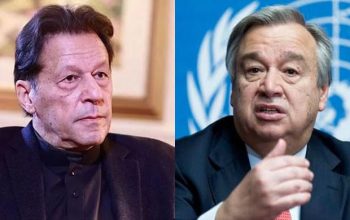Finance Minister Muhammad Aurangzeb said prior actions for the International Monetary Fund (IMF) programme are largely complete, adding that some structural benchmarks will also be met as Islamabad moves ahead to secure a larger and long-term deal.
The remarks from the former CEO and president of HBL came during Aaj News programme News Insight with Amir Zia. The show was aired Monday night.
Citi expects Pakistan to strike new $8bn IMF deal by end-July
When asked what are some of the structural benchmarks Pakistan has to agree to with the IMF, the finance minister said that the country cannot run on the current tax-to-GDP ratio.
“We have to take it to 13pc and implement reforms in the power sector as well as the state-owned enterprises as well as digitise our taxation system.”
The minister said that the upcoming IMF deal should be referred to as a “Pakistan programme” for implementing structural reforms needed to transform the country’s economy.
IMF, Pakistan make ‘significant progress’ towards staff-level agreement, lender says
“It should be called the ‘Pakistan programme’ which is supported and funded by the IMF,” he stressed.
The minister went on to say that if Pakistan failed to carry out structural reforms then the current situation cannot be sustained.
The finance minister said that it was important to understand the nature of the IMF programme.
“It is not an end itself but a means to an end,” he said, adding that the current stability in the economy was a fact which can not be ignored.
Our income growth is a fact, and the stability of our currency is a fact too, along with other indicators, Aurangzeb said.
We understand the pain, will provide relief to salaried class at first opportunity we get: Aurangzeb
The minister mentioned that the new IMF initiative was essential for achieving stability.
While the size of the deal matters, it’s equally crucial for us to demonstrate to the international community that the Fund serves as a safety net, he said.
“It is the stamp of approval that counts,” the minister reasoned.
“This shows that the economy possesses the power to propel forward for both domestic and international investors,” he contended specifying why the IMF deal was required by Pakistan.
Our objective is to move the discussion to a staff-level agreement by this month, he said.
When inquired about expanding the tax revenue by 40 percent and in case it was doable, he said the government would do it by various enforcement measures, covering gaps that are present in tax collection.
New taxation steps come into effect today
“We are going for end-to-end digitisation of the FBR and introduce more transparency in the system,” the minister said.
The numbers of the budget become meaningless when the new financial year starts and people fear a mini-budget will come, is there is a concern regarding a mini budget
The minister clarified that there was no concern reading the mini-budget as he said that measures were implemented in the final budget to address this concern.
Aurangzeb said that agriculture and Information Technology are two areas of growth that we have to target. “I believe that IMF or no IMF, these are our two growth sectors whose 90 percent controls are with us regarding their financing, improving yields,” he said.
“Both sectors have shown very very promising results in the last fiscal year.”
The finance minister said that the government will provide relief to the salaried class at the first opportunity it gets. “The first opportunity we get, we will provide relief to them,” he said.
Islamabad enforced new taxation measures of Rs1.761 trillion, taken through Finance Act 2024, from July 1, 2024, including increased tax burden on the salaried class and heavy indirect taxation on the general public including the imposition of sales tax on stationery items, dairy products and poultry feed.
Read the full story at the Business Recorder - Latest News website.


